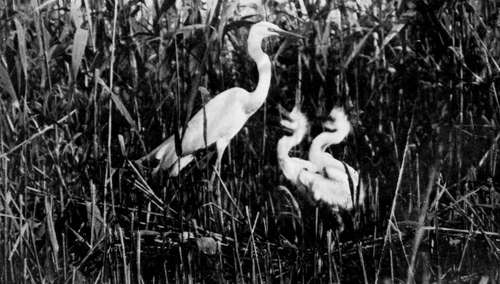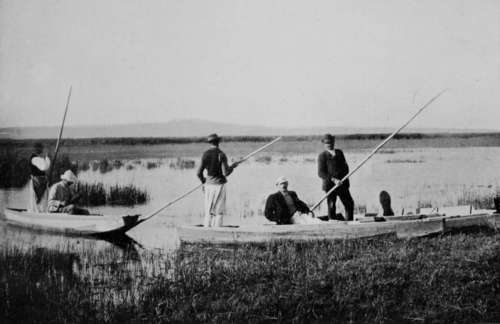The Search After The Great White Heron. Part 9
Description
This section is from the book "Bird-Hunting Through Wild Europe", by R. B. Lodge. Also available from Amazon: Bird-Hunting Through Wild Europe.
The Search After The Great White Heron. Part 9
I had started the search with a pair of wading-trousers. They were very old, however, and had seen much service in England, Scotland, Spain, Holland, and Denmark, and were nearly worn out when I started, and the reeds here had quite finished them some days ago. They were literally cut to ribbons, and perfectly useless, having gashes in them over a foot long, so that I had to finish the work without them.
On the first of these two days the hen bird came to the nest, but in a very timid, hesitating manner, first of all not actually on the nest, but a little way behind it. She waited there a few minutes, and then flew off, as if she didn't like the look of things. An hour later she came again, but still on one side, and I made one exposure. Two hours after that I had another chance, after which she advanced right into the nest and fed the young like a Spoonbill, leaving before I could get another plate in.
The young ones were very disappointed, and so was I. Their note when they see their parents in the neighbourhood of the nest, and when they alight, sounds exactly like 1 Be quick, be quick,' and in this I quite sympathized with them. I knew that the poor little beggars must be hungry ; and so was I very hungry, and very wet, and very tired of standing there so long, and I was quite as anxious as they were for her to ' be quick.'
I was much annoyed by my men, two of whom were waiting at the edge of the water, talking loudly, and even singing, to pass the time, though I had particularly told them to be quiet. The next day I sent them back to the village in the boat, telling them to come for me in the evening. I thus had the place entirely to myself. I ought to have done this before, for hardly had they left the place than the bird returned to the nest, standing up well in the middle as I had seen her the day before. I had made up my mind to be satisfied with no other position, but to keep on until I had secured it, so that I was pleased at having succeeded so early in the day. After that I had to wait two or three hours, as she seemed more timid than ever, and when she did come it was only to the back of the nest, where I could barely see her through the reeds. As her young ones couldn't get to her, she gradually forced her way through and stood in the nest, where I was able to photograph her several times.

Great White Heron And Young (Ardea Alba)
The electric camera was also set at a neighbouring nest, and I found it had gone off at the end of the day. I had hidden it on what I had thought was an empty nest, but when I went to it I found a young Grey Heron, nearly fledged, sitting on it. For the bird to make the exposure I had stretched a fine green thread over the nest, so that on returning she would be bound to touch it.
These few photographs of the Great White Heron cost me no less than six days' hard work in three and a half feet of water, while I had spent a whole month in the search for a nest.
There were a good many Marsh Harriers about, which seemed to pay much attention to this heronry. Many young birds had been devoured in the nests, but whether the Harriers had killed them first, or whether they had simply devoured the dead ones they found I cannot say. Eagles, too, were constantly seen flying over, also the Mediterranean Herring Gulls (Larus cackinnans). These birds were nesting not far off on a sandy stretch with occasional bushes and pools of water. There also was a large colony of Caspian Terns apparently nesting, although I could find no eggs. Norfolk Plovers were numerous, and I found two of their stone-coloured eggs after noticing the place from which a bird had risen. A few Pratincoles also frequented the same spot, and I picked up one day a broken egg-shell. Purple Herons were common, and daily a Bittern boomed close by. I could hear them booming every night, while a Scops Owl regularly uttered its curious cry from across the river, and sometimes a glimpse of one could be seen flying over the house. Little Owls also are common here ; I have often seen them sitting on a house-roof in the broad sunshine in the middle of the towns and villages.
Bee-eaters were abundant, and were often seen sitting on the single telegraph wire which here crosses the river. One day we borrowed a spade and dug out a couple of holes in the level ground, but though the burrows extended four feet in length there were no eggs.
Having at last finished with the Herons it was necessary to rush back to Dulcigno in order to catch the steamer. There is no time to spare, as if I missed it I should have to wait another week.
At the little inn in Dulcigno I had left one big box of luggage when I went to Scutari. At the last moment, with the horses at the door to take me to the Val de Noche landing-place, the landlord presented me with a bill charging rent of my room for the twenty days I had been away, on account of the box left in his charge. Of course I refused this demand and offered a napoleon in full payment of everything. But there was no time to argue, or I should have lost my passage, and I had to pay under protest.
Judge of my surprise when, on arrival at Antivari about three hours afterwards, I received a telegram that was waiting for me from Djouraschkovitch, which said, 'Autorite judicial vous envoie 34 courronnes que la patron de l'hotel vous a fait illegalement payer.'
Three hours in which to bring an action, receive the money, and forward it by telegram in time to catch me at the next port strikes me as a smart bit of legal work, and a record for speed.
I was very glad of this money, for I was running very short, and could not draw any more on my letter of credit until I reached Budapest. Without it I should certainly have stuck on the way, for as it was I only lasted out by going practically without anything to eat the last day, and arrived at my hotel in a penniless condition without enough money to pay for the cab.

On Valencze See
Continue to:
- prev: The Search After The Great White Heron. Part 8
- Table of Contents
- next: IX. Birds'-Nesting In Hungary
